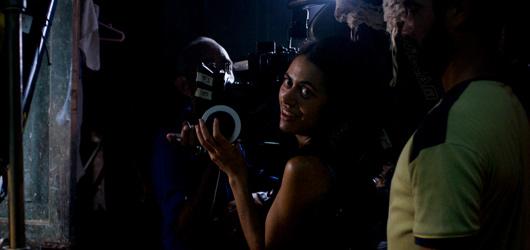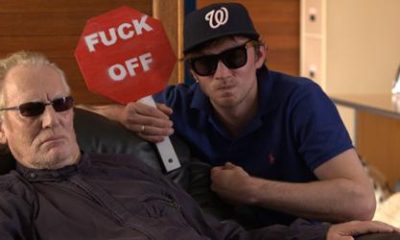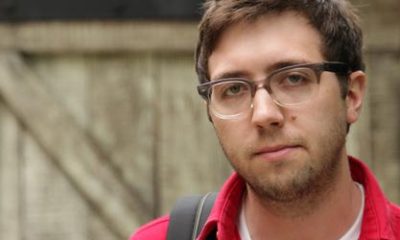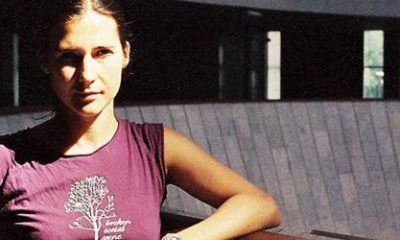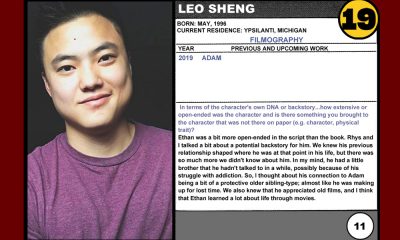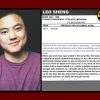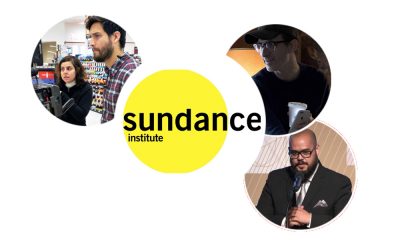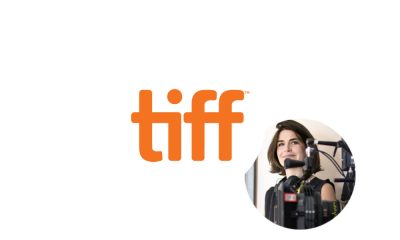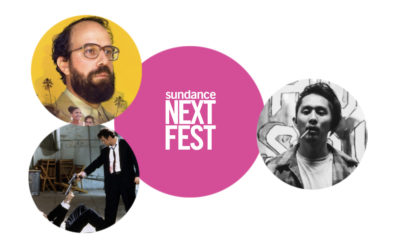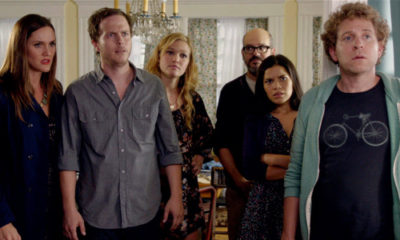Retro IONCINEMA.com
In the Pipeline: Lucy Mulloy’s Una Noche
I have spent a lot of time in Cuba, so it didn’t feel foreign. With the actors we spent over a year rehearsing. They were not actors before Una Noche, so I wanted them to spend a lot of time with me and with each other so that they would feel really comfortable. We built up a lot of trust, which was important. We spent a lot of time doing improvisations, working through the script and work-shopping constantly until we started to feel like we were ready to shoot.
Cuba is a country that has been trapped in time, bursting with music, color, and life. Most Americans won’t have the opportunity to experience Cuba as it exists now. Lucy Mulloy and her first feature film, Una Noche, are giving us a window to that forbidden world.
The daughter of two animators, Lucy comes from a filmmaking family. She had studied politics in undergrad and traveled to Havana after graduation. Captivated by its stunning beauty and sadness she stayed longer than planned and inspiration seeped in. Later, at NYU for her graduate degree in film she knew she wanted to tell a story about the journey from Cuba to the United States. It is a central story in the lives of many Cuban families; one that she heard often from the people she met when she was there. Una Noche is Lucy’s version of this story, told as honestly as possible and infused with Cuban heart.
Lucy is currently wrapping up post-production in New York and final sound and music recordings in Cuba. We met in her editing suite at NYU to talk about the film.
Nicole Emanuele: Please tell me the story behind Una Noche.
Lucy Mulloy: Una Noche is set in Havana and follows a day in the life of three teenagers pushed to choose between staying and facing their demons or braving the treacherous 90 miles of ocean that stands between them and their dreams.
Emanuele: Did you have any difficulties traveling to Cuba?
Mulloy: No, it’s not hard from the UK because there is a lot of tourism. People generally go to Havana with no problem. It’s not like the states.

Emanuele: Can you tell me a bit about your casting process?
Mulloy: I started interviewing kids from the Havana acting schools and the usual routes to find actors. I had a very specific idea of how they looked and who they were. I found that most of the actors we met were trained for theater and that was not what I was looking for. I wanted them to feel very real and understated in their performances. It became clear that I had to meet real teenagers for the roles.
We had a huge casting. We went out to all of the schools in Havana, all the beaches, parties, and concerts. We gave out flyers for our casting calls and we met thousands of kids. When I saw Dariel Arrechaga I knew immediately that we had found Raul, one of the main characters. He came to three auditions before he was cast. From there we cast the other main characters. Anaylin De la Rua (who plays Lila) was given a casting leaflet on the beach and Javier Nunez (who plays Elio) was photographed along with hundreds of other kids in his school.
Some of the other characters were also really hard to find. We did a lot of street casting; we spent many nights on the Malecon at 4am, meeting Havana’s most beautiful transvestites. It was months before we found Lachi, who is a real talent. For the guys who hook onto buses on their bikes, which is a very skilled extreme sport in Havana, we had to stop lots of kids on their bikes and get them to audition.

Emanuele: What was it like directing teenagers, and adding to that – teenagers from a culture that is so unlike ours?
Mulloy: I have spent a lot of time in Cuba, so it didn’t feel foreign. With the actors we spent over a year rehearsing. They were not actors before Una Noche, so I wanted them to spend a lot of time with me and with each other so that they would feel really comfortable. We built up a lot of trust, which was important. We spent a lot of time doing improvisations, working through the script and work-shopping constantly until we started to feel like we were ready to shoot.
Emanuele: Where did you get the camera you used from?
Mulloy: Cameras were from Arri in London. Arri Media were a great support as were Clairmont Camera in Toronto. Trevor Forrest and Shlomo Godder were both DPs on Una Noche and they were great at working out streamlined packages and making the very best of what was available to us when it came to shooting. We got great support from Kodak also. Una Noche was only really possible thanks to an incredible amount of good will, support and a lot of amazing people coming together, believing in it and putting all their energy into the production. We shot on 35mm film, so when all of the film stock had been collected up and when the camera was available, we got the crew together and started.

Emanuele: I guess it’s really good that you had the main actors all ready.
Mulloy: During shooting that was one of the main things that felt like it wasn’t a variable. We didn’t know when the electricity was going to go out, there were black outs all the time, cars would break down, monsoon rain, crew would get ill, etc. I knew that there would be a lot of variables on set when we started shooting, so I wanted the actors to be on point and know exactly what they were doing and what to anticipate on a set.
Emanuele: The film is in Spanish, did you direct entirely in Spanish?
Mulloy: I directed all the cast in Spanish but I had to speak English to some crewmembers from the UK. We had a mainly Cuban crew, but everyone understood each other. The crew worked really hard together under difficult circumstances and it worked out well.
Emanuele: What were the benefits of shooting in Cuba?
Mulloy: In general people would be so accommodating and helpful to the production. We had really great extras and additional characters who just happened to be in the street at the right time. People were excited to be in the movie, but not in a way like here, because people there aren’t impressed by the idea of celebrity; they were genuinely interested in being involved.
Another amazing aspect of working in Cuba was working with incredibly talented musicians, rappers and singers. We recorded original music for the movie, which was a really exhilarating experience. There is a lot raw talent in Havana and it was an honor to collaborate with artists there.

Emanuele: If you could, summarize the brief history of the film so far.
Mulloy: From the beginning, I thought this film was going to be finished in one summer. It’s my thesis project for NYU, and initially it was going to be a short film shot on video and then it became a feature film on 35mm. I worked on getting sponsorship initially. People were incredibly supportive. A good friend of mine Mark Nichols believed in Una Noche from the very beginning, he is an Executive Producer on the movie now. I was developing the script while I was in Havana, so I went out with a synopsis and from there it just got bigger and bigger. The permits were delayed coming through and the producers were working around the clock to make it happen. It was everybody’s first feature, so we were learning together. It was really a bunch of friends coming together to make our dream into a reality. It became a much bigger, more ambitious project and more people got involved. We did everything they told us not to do at film school – shot on the ocean, kids, animals… all novices… in Cuba… a country that has a US embargo… but it all started working out. Our initial shoot was over 30 days. We also went back for re-shoots.
Emanuele: Was it a hard adjustment when you realized this was going to take a lot longer than you anticipated?.
Mulloy: I don’t think I made that adjustment. I always thought everything was going to happen soon. When I’m making a movie, I’m thinking about the current process of what I have to do now. There are always hurdles to cross so I was thinking about the immediate hurdle in front of me as opposed to three hurdles ahead. I was doing a lot of production stuff too so there wasn’t really time to make any adjustment and think “It’s going to be years making this movie.”
Emanuele: What’s happened since the production wrapped?
Mulloy: I have been editing constantly. I got a rough cut together and we went though Tribeca All Access and the IFP Lab. [At IFP] You meet this other group of talented people who are in the same position as you, having shot their first feature. I think that a lot of people went into making films as artists and having something that they want to say and express, but not necessarily being that savvy about how to get it to the next stage. It’s a relief to know that there are people there to guide you in the right direction. I also met my editor Cindy Lee through another filmmaker, Andrew Dosunmu, at the IFP lab and I am so very grateful for that. She is really wonderful to collaborate with and has made a huge difference to the post-production process.
Emanuele: Before you had done IFP had you let anyone else watch the film?
Mulloy: Spike Lee is great at giving editing advice. He is very generous with his time with NYU students and is really supportive. Also, my parents are animators and are incredible at giving feedback so they helped a lot.
Emanuele: You said the film has changed a lot since you started. Has it been difficult to change your vision?
Mulloy: No! It feels really good. It’s really nice to see the film evolving. I feel like all of those changes are pushing it forward and making it better from what it was initially intended to be. Using the footage creatively in different ways has given more layers to the story and the characters.
Emanuele: How long were you editing the film for?
Mulloy: Too long. I basically did a rough cut. Just having another set of eyes in the edit room has been great. I was used to cutting my own short films, and for language as well, it was hard to find somebody that spoke Spanish and understood the cultural nuances that come through in the movie so I did the rough cut myself. Cindy doesn’t speak much Spanish, but we work together so it works out well.
Emanuele: What’s been the most helpful part of the filmmaking process? What’s been the most difficult part?
Mulloy: I think the best part was working with the actors and building up a relationship with them that allowed us to trust each other and work together intuitively. That was the hardest part as well, leaving them. It’s a trilogy, so I really want to go back and make the next one. It’s hard because I don’t know if they would be able to come to a premiere or screenings outside of Cuba.
One of the other things I learned on Una Noche was not to be scared of a 35mm camera. You can pick it up and shoot. It’s not going to break. You can treat it in a way that’s not so precious and be free with it. I really enjoyed camera operating.
Emanuele: My last question is what advice would you give to upcoming filmmakers?
Mulloy: Don’t be scared of the process. It can be daunting. Know that it is actually possible to realize your story and make it come true. Don’t allow things to be problems, be creative and think around them. People will say no, inevitably there will be issues but there is always another solution. You just have to get your shots no matter what and make it work out.
Look for Lucy Mulloy’s directorial debut to premiere on the film festival circuit in 2012 — for more info visit facebook.com/UnaNocheFilm.



